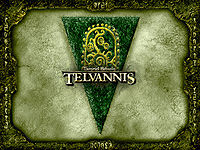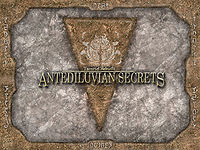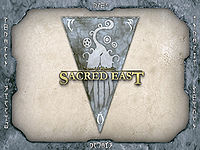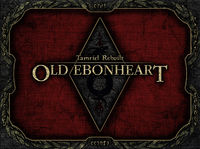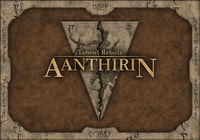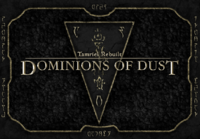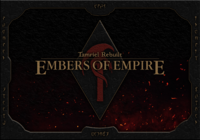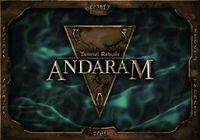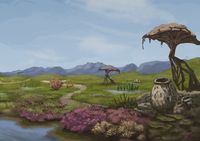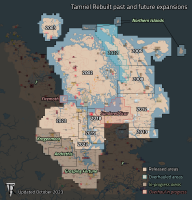Tamriel Rebuilt:Main Page
| Home Page | Tamriel Rebuilt |
|---|---|
| FAQ | FAQ page |
| Download | Downloads |
| Setting | Mainland Morrowind |
Tamriel Rebuilt (commonly abbreviated as TR) is the largest collaborative fan-based modding project for the Elder Scrolls series, with the goal of creating the mainland of Morrowind.
Tamriel Rebuilt currently covers all of northeastern Morrowind and much of the eastern and central part of the province, with the latest release adding the remainder of the Aanthirin region. Future development will focus on the southern portion of the province, including the fungal forests of Othreleth Woods and Coronati Basin, and the winding canyons of Shipal-Shin. The project has existed since before Morrowind's release, though the leadership and members have changed many times since then.
A collection of province mods, Project Tamriel, shares assets with Tamriel Rebuilt through Tamriel Data, and they are meant to complement each other.
Both expansions, Tribunal and Bloodmoon, are required to play this mod.
Release Splashes
Since the original Telvannis release, Tamriel Rebuilt has maintained the tradition of creating a promotional splash for each major landmass release.
|
|
Gameplay Information
Gameplay information specific to its inclusion in TR. For more generic information not listed here, see the main Tamriel Data page.
- Diseases — The less pleasant souvenirs you may bring back from the mainland
- Items — New items on mainland Morrowind
- Quests — A guide to all major and minor quests for Tamriel Rebuilt
- Reputation — A list of quests that give you fame points
- Spells — New spells known to mainland inhabitants
- Starting Out — Hints to help you in the new additions that encompass Tamriel Rebuilt
World Information
World information specific to its inclusion in TR. For more generic information not listed here, see the main Tamriel Data page.
- Creatures — A list of the new creatures to kill and maim
- Factions — A guide to the old and new factions found on the mainland
- Maps — A collection of maps that detail additional areas
- People — A list of all people added by the mod
- Places — A guide to cities, towns, dungeons, and ruins in mainland Morrowind
- Services — A list of the services of trainers, merchants, armorers, and mages
- Transport — A list of the various modes of transport on the mainland
History
Origins
Tamriel Rebuilt was founded in 2001 by a gaming enthusiast under the alias 'Ender', as a reaction to Bethesda's announcement that the then-upcoming The Elder Scrolls III: Morrowind would not contain the entire province, but merely the island of Vvardenfell. Over the years, this very large and long-lived project has been supported and built by over 200 developers, modders, and contributors.
Before 2010, Tamriel Rebuilt planned to divide the mainland of Morrowind into six distinct maps, all of which were to be developed separately and sequentially. A reorganization in 2009 redivided the landmass into eight maps with hopes of increasing productivity and general public accessibility. After further reorganization in 2014, the TR team again changed the project's release structure, focusing on releasing playable areas as they're finished, rather than the eight major planned "releases". The project's vision has also undergone a change, and now works to integrate itself with the original game's content to make the entire province feel and play like one seamless experience.
Pre-Old Ebonheart
The Map-based releases that were completed and released to the public include Maps 1, 2, and 3.
|
Both Telvannis and Antediluvian Secrets cover the northeastern peninsula traditionally ruled by House Telvanni, but now facing Imperial and Tribunal Temple incursion. Sacred East is centered around House Indoril's eastern cities and the sacred Temple city of Necrom.
Releases after Sacred East were no longer labeled by Map, but by a (Year).(Month) version number, starting with 14.08 (August 2014). Versions between the last update to Sacred East and 18.07 did not add any new playable landmass, but rather worked on integrating existing content with the original game through the use of separate plugins:
|
Old Ebonheart and Beyond
The next main release, 18.07 (31 July, 2018), titled Old Ebonheart, was focused around the central Imperial city of Old Ebonheart, located in the northeastern part of Aanthirin, the region directly south of Vvardenfell and home to the mighty Thirr River. The Old Ebonheart release marked a turning point in TR development, with a deeper focus on forward planning and quality control.
Following Old Ebonheart was 19.12 (19 December, 2019), titled Aanthirin, which completed that region and includes the notable settlements of Almas Thirr, an important river crossing and pilgrimage city controlled by the Tribunal Temple, and Roa Dyr, the beautiful chapel city of Indoril Ilvi. 21.01 (30 January, 2021) was a maintenance release for Aanthirin. 22.11 (24 November, 2022) followed almost two years later, featuring twin expansions: Dominions of Dust, which expanded west to add much of Roth Roryn, the Armun Ashlands, and the Velothi Mountains; and Embers of Empire, an overhaul of the western part of the Telvanni Peninsula, including the Imperial city of Firewatch (initially released in 2006) and the town of Helnim (first publicly available in 2008).
The next main release, 23.10 (31 October, 2023), followed within less than a year. Titled Andaram, it revamped the canton city of Almas Thirr into something larger and grander, and extended the Aanthirin region all the way south past the town of Hlan Oek. Keeping in line with their plan to release an update every year, the next main release, 24.12 (23 December, 2024), added the mini-expansion Firemoth Rekindled.
Future
The next major release will be called Grasping Fortune, which will include the long-awaited Hlaalu capital of Narsis, and much of the Coronati Basin and Shipal-Shin regions. Work is also underway on revamping the Sundered Scar region into a sulfur pool wasteland, with a new island added in Azura's Bay taking the name Gorne from the island currently bearing that name. This side project is going by the internal name Poison Song and will be released when ready, along with parts of the Alt Orethan region surrounding Almalexia. Other minor additions in progress are a TR version of Firemoth (renamed Saros Archipelago) and a collection of islands near the Telvanni Isles.
Following Grasping Fortune, land expansion will round out House Hlaalu's holdings with Wealth Beyond Measure, focusing on Othreleth Woods and the city of Kragenmoor.
Further releases will proceed up through Velothis District to complete House Redoran (plus the Orc-inhabited mountain region of Malahk-Bazul) and return to the southeast to explore the Deshaan Plains, other House Dres lands, and a slice of northern Black Marsh. The massive capital city Almalexia is likely to be saved for last, although developers have expressed interest in getting it done sooner.
Finally, there are major plans in place to redo the old Maps 1 through 3 areas to bring them up to current standards—at a date often jokingly set to be the year 2090. The epilogue of Tamriel Rebuilt will be to begin development on a new project for Black Marsh, under the working title Eye of Argonia.
Plugins
Tamriel Rebuilt requires the installation of a main file and the standalone Tamriel Data asset archive. There are several optional plugins to choose from as well.
- TR_Mainland.esm
- The main mod file, which adds all officially released lands and quests.
- TR_Factions.esp
- Slows down advancement in some factions to accommodate for Tamriel Rebuilt's new quests, changes dialogue to reference the mainland, adds faction reactions to new factions, and requires you to convince more councilors for the Hortator quests (only Telvanni for now). For more information, see the Factions page.
- TRMusic
- Includes three new battle tracks and seven new exploration tracks that may play anywhere in the game. It is packaged as an optional download on the main download page. A more recent Original Soundtrack utilizing MWSE is available as a separate mod.
Organization Process
Overview
Development of a region typically starts off with planning and conceptualizing the lore (such as important locations, people, and factions), assets, and appearance of the area. Asset development is started early on, and remains the primary bottleneck for exterior development to start. As exterior claims are completed, interior claims open up. NPCs, creatures, and generic dialogue are included when all necessary interiors are done. Quests and questlines are designed, written, implemented, and playtested. With all of these components merged into one section file, they can be combined with the main mod.
Development
Files for Tamriel Rebuilt are organized into individual assets, claims, and release files.
Assets are the building blocks of the game world, including Models, Writing, and Audio. An asset can be proposed by any member. Once an asset has been created, it undergoes a reviewing process. Should it be accepted, it will either be turned into a claim (such as in the case of quest designs), or flagged for merging into a temporary add-on to Tamriel Data, which itself is merged into the main Tamriel Data files when there is a major release.
Claims are individual playable aspects of the mod, which make use of all created assets: Exteriors, Interiors, and Quests. Once a claim has been fulfilled by a developer, it undergoes a similar reviewing process. Designated users thoroughly examine every aspect and detail added by the claim, fixing issues they find so that the claim can be set as ready to merge. If the claim has too many issues or does not fit the claim description, it can be rejected and returned to the original developer for a redesign. Incorrectly placed objects are the most common issue with exteriors and interiors, with terms such as "casper", "floater" and "bleeder" used to describe their bad placement. Quests may have scripting errors, dialogue typos, and dialogue loops, among many other issues. For this reason, quests are playtested by various people at all stages of the claim process.
Claims and assets are given a priority: low, medium, high, and critical. For claims specifically, critical means required for the next release, high for two releases away, medium for three releases away, and low for anything else.
Release files include TR_Mainland and various section files that together form both publicly released and developed (but not yet finalized) areas. Section files are checked out by senior developers and most work involves merging completed claims so that a connected game world is formed, as well as fixing bugs. All section files are publically available for download, and can be accessed via the Tamriel Rebuilt site, and this is encouraged for playtesting purposes. When nearing a release, one or more sections are merged into TR_Mainland. Tamriel Rebuilt formerly packaged all unreleased areas in a single esp, TR_Preview. This practice was discontinued following the 22.11 release in 2022, due to the time needed to maintain preview and the confusion it caused players who had no way to determine which areas were finished and which were not.
Release Cycle
Following the first three large-scale releases, Tamriel Rebuilt switched to a quarterly (later biyearly) release cycle and soon began to make incomplete content available through TR_Preview. This was done to keep the mod from appearing inactive for long periods of time. This cycle lasted until near the completion of the Old Ebonheart release in 2018. Since then, Tamriel Rebuilt has a named release only when a new part of the landmass is finished, with a bugfix update in the following months.
Website
Tamriel Rebuilt's website is divided into Development (containing the Asset and Claims browsers, Bugtracker, and Release Files) and Community (containing the Forum, Discord, and Matrix links) and access is restricted to certain members of the project. Guests can view all forums, claims, and assets. Members can comment on each of them and ask for the assignment of assets, and developers can ask for assignment on claims and assign themselves to assets.
Planning and general meetings are held on Sundays in TR's Discord server in a dedicated meeting channel, assuming developers have agreed on something to discuss. All meetings are open to the public and everyone is welcome to join and contribute.

